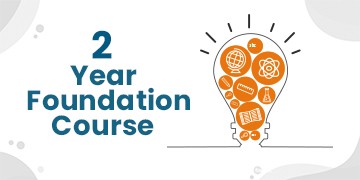
706 1st Floor Dr. Mukherjee Nagar Near Batra Cinema Delhi – 110009
Overview of Classroom Foundation Courses
Introduction
Classroom foundation courses are designed to equip students with the essential knowledge and skills necessary for their academic journeys. These courses focus on fundamental concepts across various subjects, laying the groundwork for more advanced studies. By emphasizing core topics, foundation courses help students develop a strong intellectual base, enhance critical thinking, and improve their overall learning experience.
Objectives of Foundation Courses
- Skill Development: The primary goal of foundation courses is to provide students with essential skills in areas like reading, writing, mathematics, and critical thinking, which are vital for academic achievement.
- Conceptual Understanding: These courses promote a deep grasp of fundamental concepts across disciplines, allowing students to effectively apply their knowledge in more advanced coursework.
- Confidence Building: Mastering foundational skills boosts students’ confidence, encouraging them to engage actively in their academic activities.
- Preparation for Higher Education: Foundation courses prepare students for the demands of higher education by introducing key concepts and study techniques beneficial for future coursework.
Common Subjects in Foundation Courses
Foundation courses generally cover a variety of subjects, including:
- Mathematics: Emphasis on basic mathematical principles such as algebra, geometry, and statistics to develop quantitative reasoning and problem-solving abilities.
- Language and Communication Skills: Focus on reading comprehension, writing skills, and oral communication, enhancing students’ ability to express themselves clearly and effectively.
- Science: Introduction to basic scientific concepts in biology, chemistry, and physics, fostering an understanding of the scientific method and critical inquiry.
- Social Sciences: Examination of fundamental concepts in history, geography, and economics to help students understand societal structures and human behavior.
- Information Technology: Basic training in computer literacy, covering software applications, internet research, and digital communication tools.
Teaching Methodologies
- Interactive Learning: Engaging teaching methods that encourage student participation, including group discussions, hands-on activities, and collaborative projects.
- Assessment and Feedback: Regular quizzes, assignments, and assessments provide students opportunities to demonstrate their understanding and receive constructive feedback.
- Multimedia Resources: Use of videos, interactive presentations, and online platforms to enhance learning and accommodate different learning styles.
- Personalized Learning: Customized instruction that addresses the diverse needs of students, offering differentiated learning experiences based on individual strengths and weaknesses.
Conclusion
Classroom foundation courses are essential for equipping students with the knowledge and skills necessary for academic success. By focusing on fundamental concepts across various subjects, these courses foster critical thinking, build confidence, and prepare students for the challenges of higher education. With a solid foundation, students are better positioned to pursue advanced studies and achieve their academic and personal aspirations.
